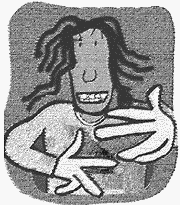It would be an understatement (not to mention a clich驠to say that there was anticipation in the air as a sold-out crowd awaited the arrival of the Roots at the Fenix two weeks ago. As one member of the audience accurately observed, “This place couldn’t be readier.”
Although he was speaking for that particular moment, he could just as easily have been referring to the hip-hop world in general. In 1999, hip-hop couldn’t be readier for the Roots, a hip-hop band that uses live instrumentation but has nothing to prove. They are today’s foremost exponents of what the Akan people of West Africa call sankofa: going backward to go forward. Sankofa means that the weight of the past need not be a burden—that engaging with history can itself be a path to the future. The Roots not only understand this principle, they positively embody it.
the Roots‘Things Fall Apart’ (MCA)
Fenix, Wednesday, March 3
Most forms of music, after they’ve been around a while, experience a split between progressive fans, who embrace the experimentation that gave birth to the genre in the first place, and traditionalist factions, who believe that something essential is lost when artists go too far. In the case of hip-hop, both sides clearly have justified bones to pick. Purism is understandable: Too many people who hail “progressive” hip-hop are strikingly uninformed about the music’s core values and culture. I personally cringe, for instance, every time I hear a new rap group characterized as innovators simply because they use live instruments. As if artists (and I mean artists) like DJ Premier and Pete Rock don’t use live instruments just because it never occurred to them. No. Hip-hop uses samples because they sound good; there’s an aesthetic at work here. And—the purist would argue—it’s a sensibility that is worth protecting.
But at the same time, no form of music can survive without change. As much as we all respect Grandmaster Flash and Public Enemy, even traditionalists don’t think we should be making music like theirs today. So what’s a hip-hop ideologue to do? The Roots teach us that we can (in fact, must) have our cake and eat it too; it’s only by understanding hip-hop history that we can move forward in any valuable way. Their use of live instrumentation is in tune with the artistic vision of sampling elders like Marley Marl and Ced-Gee. They don’t discard the tradition, they reinterpret it. This is sankofa.
In years past, the Roots themselves sometimes sounded defensive about their use of live instrumentation. They laced their shows with cover versions of classic hip-hop songs, thus trumpeting their commitment to hip-hop traditionalism. But even this move was still progressive in its conception, because it was the use of live instrumentation that allowed them to perform covers in the first place. After all, how would you cover a hip-hop song without live instruments? Sample the same song? It’s the same song!
But the Roots are grown now, full grown, and it is precisely their confidence in hip-hop as an expression of a longer tradition that makes them a force to be reckoned with. At the Fenix, for instance, the band took the stage only after winding through the crowd playing cowbells, an entrance that dates back to the earliest days of African America. Upon reaching the stage, drummer ?uestlove sat down at his kit and seamlessly flowed into a hip-hop beat. Only then did the Roots’ primary lyricist, Black Thought, begin to rhyme, his voice reaching out over a tapestry of rhythm. As far as traditionalism and innovation go, this was not either/or music—it was both/and.
The Roots’ use of beatboxing (vocal imitations of drum sounds) is another example of moving backward to travel forward. While beatboxing is a particularly grassroots aspect of hip-hop, the Roots’ mouth doctors, Scratch and Rahzel “the Godfather of Noise” (both of whom contributed to the group’s new record, Things Fall Apart, though only Scratch appeared in Seattle), are moving the technique well into the 22nd century. Scratch’s solo at the Fenix moved from conventional drum sounds to turntable stabs (which themselves included snippets from well-known hip-hop songs, such as “Posse on Broadway” by Seattle’s own Sir Mix-A-Lot) to a complete deconstruction of music as we know it. As ?uestlove mimed turntable maneuvers, Scratch supplied the sounds that would be emerging, had an actual turntable been present.
The performance was simultaneously a premillennial reinterpretation of the role of technology (the turntable) as a mediator of popular music, a postmodernist discourse on the juxtaposition of aesthetics, and a guy making really cool noises with his mouth. With the Roots, you don’t have to choose. And in this era of tribulation and fractiousness, not having to choose may be the greatest gift of all.





